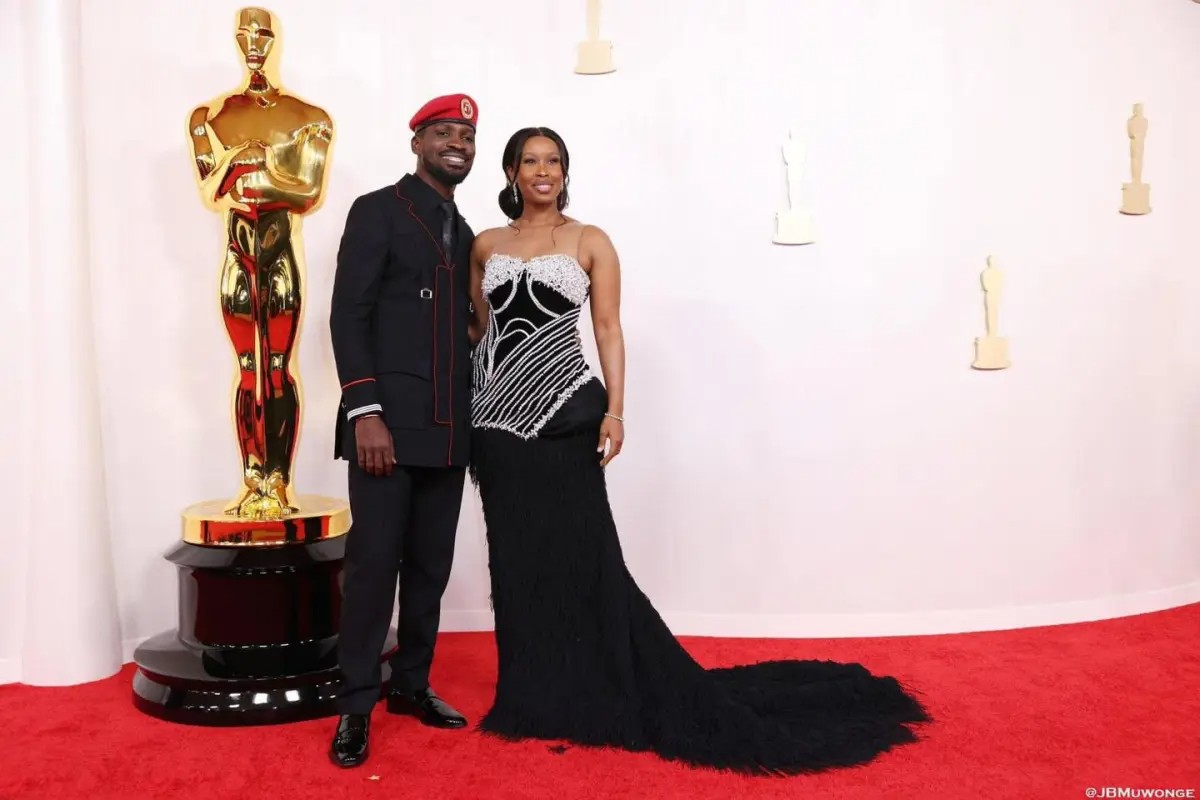The 96th Academy Awards, widely branded as the Oscars, were held Sunday night, March 10, at the Dolby Theatre, in Hollywood, USA. Like many other editions of the Oscars, the anticipation and hysteria has been high, building up to the awards night, with many incredibly good films, released in 2023 nominated for the prestigious accolade.
Worth noting, this year’s Oscars had quite a significant number of first-time nominees, actors, Directors, some of whom were lucky to walk away with the coveted Oscar award.
Speaking of which, Uganda’s very own filmmaker, Moses Bwayo, was one of the nominated Directors – a first-timer at that. Bwayo was nominated alongside Christopher Sharp and John Battsek for Bobi Wine: The People’s President, in the category of Best Documentary Feature Film.
Having studied journalism, and later trained as a production sound recordist and cinematographer at Kampala Film School, Bwayo’s footprints in film could not be easily traced, until around 2014, when he worked closely under Indian-American filmmaker Mira Nair on projects like A Fork, a Spoon and a Knight, and later, Queen of Katwe, in 2016, as a boom operator.
ALSO READ: NatGeo acquires worldwide rights to Bobi Wine’s documentary – ‘Bobi Wine: Ghetto President’
A year later, Bwayo would meet Ugandan musician-turned-politician and activist – Robert Kyagulanyi, commonly known as Bobi Wine. Then, Kyagulanyi had just started curving his political path, attracting a lot of attention and shaping a unique discourse in Uganda’s. Bwayo would pick interest in this eventful journey, and together with another Ugandan-born film enthusiast – Christopher Sharp, they approached Bobi Wine, interesting him in documenting his political journey.
“I was impressed with what Moses and Sharp wanted to do, and agreed to it,” Bobi Wine told The Times.

Fast-forward, for six years, Bwayo, Sharp, and the rest of the crew, followed and filmed Bobi Wine’s political trail, his family, heated run-ins with security operatives, the historical 2018 Arua debacle, in which Bobi Wine’s driver was shot dead, the 2021 general elections, and everything that had the name Bobi Wine on it.
Post-production of the documentary wrapped in 2022 and premiered globally at the 79th Venice Film Festival. National Geographic took it on as the main Distributor, and later, in 2023, they would give the film a limited theatrical release in New York and Los Angeles, United States.

After successful submission to the 96th Academy awards, the film was nominated alongside Mstyslav Chernov’s 20 Days in Mariupol, The Eternal Memory by Maite Alberdi, Four Daughters by Kaouther Ben Hania and Nadim Cheikhrouha, and To Kill a Tiger by Nisha Pahuja, Cornelia Principe and David Oppenheim.
While a large section of Ugandans, media outlets immediately abstained from making noise about Uganda’s first Oscar nomination, for all reasons political correctness, the nomination still became a talking point among the ordinary folk in Uganda who cared less whether or not the film had scary political undertones. Many rooted for a win anyway.
Stiff competition from 20 Days in Mariupol
Following the 2022 Russian invasion on Ukraine, a war that would take world news by storm, consequently threatening a possible third World War outburst, Ukrainian journalist Mstyslav Chernov took it upon himself to start filming and documenting atrocities and Russian assault in one of the besieged cities – Mariupol.
The film, which brings to life actual killings of over 8,000 Ukrainians, was, according to Chernov, described as “a collective resistance to tragedy”.
The film gained fame worldwide after a resounding premiere at the Sundance Film Festival in 2023. The Guardian’s critic Peter Bradshaw described the film as a searing film that bears a terrible witness to [this] great crime”.
While Bobi Wine: The People’s President was equally getting astounding reviews at various screenings held worldwide, 20 Days in Mariupol scooped awards from BAFTA and Directors Guild of America for the same category. With such revered awards leading up to the Oscar, the film was considered a strong contender for an Oscar.
Ugandan award-winning filmmaker – Matthew Nabwiso, told Plugged that, “The Ukrainian war story was always going to be a hard one to beat in any documentary category. It was a global story, not just for Ukrainians.”
While accepting his Oscar, last night, Chernov gave an emotional speech, saying, “I’m going to be the first Director on this stage to say that I wish I had never made this film. I wish I could exchange this for Russia not invading Ukraine. I wish I could exchange this Russia not killing 10,000 of my fellow Ukrainians.”

On his Facebook page, upon the climax of the awards, Bobi Wine, congratulated the makers of 20 Days in Mariupol.
Bobi Wine said: “From the outset, we always knew that if our film doesn’t win an Oscar for Best Documentary Feature, it would go to 20 Days in Mariupol – a film that speaks of the struggle of the Ukrainian people against aggression. As the war started, journalists trapped in the besieged city of Mariupol struggled to continue their work documenting the atrocities. It is a well-deserved recognition and I congratulate our people on this.”
Be that as it may, Uganda wrote her name in the pages of the Oscars history books. And undoubtedly, this nomination opened the door for many other young filmmakers in the land. It represents what’s possible. That Ugandan stories have a place on the global stage.
The main participants in the film – Bobi and Barbie, as their monikers go, showed up on cinema’s biggest stage in such style. Uganda was represented with such buoyancy. It was a win, nonetheless.
“Earning Uganda an Oscar nomination is something we shall always be proud of,” Bobi Wine ended.
Four-time host Jimmy Kimmel and why Trump could not stand him
The Oscars were a night of rewarding excellence, and indeed, some of the excellent films of 2023 were rewarded. But before all that, it was Jimmy Kimmel’s opening monologue. Hosting the Oscars for the fourth time, last night’s opening monologue for Kimmel, and perhaps the entire show, was not such a very exceptional one. It was just okay, one may safely say.
A lot of his material came from roasting most of the notable nominees in attendance, a script that is already growing old. While he made the audience laugh, there is no notable highlight to write home about.

Well, there was not one, until former U.S. President Donald J Trump took to his Truth Social account to throw shade at Kimmel, during the live telecast of the awards. Trump, who seemed tired of seeing Kimmel host the Oscars, had no kind words at all. Classic Trump!
He said: “Has there ever been a worse host than Jimmy Kimmel at The Oscars? His opening was that of a less-than-average person trying too hard to be something which he is not, and never can be. Get rid of Kimmel and perhaps replace him with another washed up, but cheap, ABC “talent,” George Slopanopoulos. He would make everybody on stage look bigger, stronger, and more glamorous”.
Charged with an urge to hit back immediately after reading Trump’s post, Kimmel interrupted the show, right before American actor Al Pacino came to present award for Best Picture. “Well, thank you so much for that, President Trump. I’m surprised you’re watching, isn’t it passed your jail time?” the crowd burst out in laughter at Kimmel’s retaliation remarks.
Not only did Trump attempt to bring Kimmel down, he also had a bone to pick with the Academy, pointing at how the Oscars are never fair, and increasingly becoming boring.
“Also, a really bad, politically correct show tonight, and for years – disjointed, boring, and very unfair. Why don’t they just give the Oscars to those that deserve them. Maybe that way, their audience and TV ratings will come back from the depths. MAKE AMERICA GREAT AGAIN!” Trump wrote.
Oppenheimer sours above the clouds
Forget the fact that John Cena unashamedly strolled across the stage completely naked, causing the audience to laugh out loud in amusement, the night was actually dominated by Oppenheimer, a remarkable film that scooped seven Oscars out of the 13 nominations it received.
From Best Picture, Best Director, Best Cinematography, Best Editing, Best Actor in a Supporting role – taken by Robert Downey Jr, to Best Actor in a Leading Role – taken by Cillian Murphy, Oppenheimer was the darling of the night, and everyone seemed to nod in agreement.

Murphy accepted his award from a star-studded group of past Best Actor winners, who included Nicholas Cage, Mathew McConaughey, Brendan Fraser, Ben Kingsley and Forest Whitaker. This must have been a surreal moment for him.
Taking to the stage, he said: “I’m a very happy Irishman standing here tonight. We made a film about the man who created the atomic bomb and, for better or for worse, we are all living in Oppenheimer’s world, so I would really like to dedicate this to peacemakers everywhere.”
This added to Murphy’s award cabinet, this awards season, which already has Best Actor from the Golden Globe, BAFTA and Screen Actor Guild Awards.
For Best Actress in a Supporting role, The Holdovers star Da’Vine Joy Randolph almost got the audience teary while accepting her award. She got teary herself.
“I didn’t think I was supposed to be doing this as a career. I started off as a singer, and then my mother said to me, ‘Go across that street to that theatre department, there is something for you’. I want to thank my mother for doing that,” she said.
For the honorary award, actress Angella Basset, comedy legend Mel Brooks, Sundance Institute’s Feature Film Program Founder – Michel Satter, and film editor Carol Littleton, were recognized.
Once the Best Picture is given out, the curtains roll down. It’s the end of cinema’s biggest night in America, but certainly not the end of the party.
To crown the night, the stars headed out to celebrate at the iconic Vanity Fair Oscar Party, held at the Wallis Annenberg Performing Arts Centre, in Beverly Hills, California.
The Vanity Fair Party is known for bringing out stars’ A-game when it comes to fashion. They all ditch their Oscars red carpet outfits for a buoyant look at the after-party. And last night was not any different.








